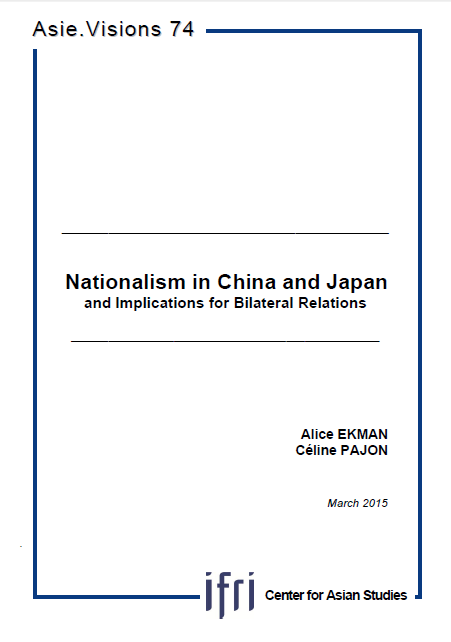Nationalism in China and Japan and Implications for Bilateral Relations

Nationalism appears to be an important part of the growing frictions between China and Japan.
In Japan, the return to power of Shinzo Abe as prime minister, and the historic breakthrough of an extreme right-wing party onto the political scene reinforce the view that there has been a clear shift to the right. Public opinion is today also more realistic about direct security threats to Japan.
However, this rise in neo-nationalism, which contains a clear anti-Chinese strain, should not be caricatured as aggressive militarism. Furthermore, it is strongly contained by democratic safeguards.
In China, the new leadership headed by Xi Jinping has promoted patriotic and nationalist ideas even more strongly than its predecessors, while still concentrating on the traditional aims of economic development and stability. Under these circumstances, the exploitation of anti-Japanese nationalism by the Party should not be overestimated: it is tolerated to a certain degree, but controlled and even repressed as soon as it risks getting out of hand.
Nationalism is thus one aspect, among others, of Chinese and Japanese foreign policy. Other key factors need to be taken into account, which may either moderate or exacerbate it. Measures controlling nationalism are in place, though they have shown themselves to be moderately effective in the face of the radicalization and sharpened sensitivity of public opinion. The acceleration of phases of nationalism along with provocations is coalescing with increasingly antagonistic views so as to reinforce security dilemmas. In fact, tensions today appear to be so strong that they have reached a point of no return. This makes it impossible to restore the status quo ante or to establish some form of reconciliation on new grounds.
Alice Ekman is a research fellow at the Center of Asian Studies (Ifri), and a China specialist. She is also teaching at Sciences Po Paris.
Céline Pajon is a research fellow at the Center of Asian Studies (Ifri), and a Japan specialist.
Download the full analysis
This page contains only a summary of our work. If you would like to have access to all the information from our research on the subject, you can download the full version in PDF format.
Nationalism in China and Japan and Implications for Bilateral Relations
Related centers and programs
Discover our other research centers and programsFind out more
Discover all our analyses
China’s Strategy Toward Pacific Island countries: Countering Taiwan and Western Influence
Over the past decade, China has deployed a diplomatic strategy toward the Pacific Island Countries (PICs). This strategy pursues two main objectives: countering Taiwan's diplomatic influence in the region and countering the influence of liberal democracies in what Beijing refers to as the "Global South."

Opening up the G7 to South Korea to Address Contemporary Global Challenges
The G7’s global influence has diminished as powers like China reshape international governance through initiatives such as BRICS and the Shanghai Cooperation Organisation (SCO). With the G7 now representing just 10 per cent of the world’s population and 28 per cent of global GDP, its relevance is increasingly questioned.
Expanding SPDMM as a pivotal institution in the Pacific – A French perspective
The South Pacific Defence Ministers’ Meeting (SPDMM) is the only forum that brings together defense ministers from the wider South Pacific — including Chile, which is hosting it for the first time. This heterogeneous group of countries with varying resources, capacities, and interests — Australia, Chile, Fiji, France, New Zealand, Papua New Guinea (PNG), and Tonga — are united by their shared determination to strengthen cooperation on maritime security and humanitarian assistance and disaster relief (HADR) activities.
EU’s Derisking From China: A Daunting Task
With economic security as a major concern, the EU has recently turned to “derisking” from China. The EU strategy entails reducing critical dependencies and vulnerabilities, including in EU supply chains, and diversifying where necessary, while recognizing the importance and need to maintain open channels of communication.












